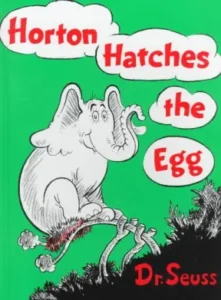 Years ago, when I managed the Baxter Branch Library, I used to read aloud to the children at the elementary school there. They had a wonderful program where fourth graders were paired with kindergartners as reading buddies. One cold and rainy afternoon, I gathered a group of students around me in the school library to read the Dr. Seuss classic “Horton Hatches the Egg,” one of my favorite books in the world. I’d enjoyed it when I was a child and so had my own three children.
Years ago, when I managed the Baxter Branch Library, I used to read aloud to the children at the elementary school there. They had a wonderful program where fourth graders were paired with kindergartners as reading buddies. One cold and rainy afternoon, I gathered a group of students around me in the school library to read the Dr. Seuss classic “Horton Hatches the Egg,” one of my favorite books in the world. I’d enjoyed it when I was a child and so had my own three children.
But I soon learned that reading “Horton” to kindergartners maybe wasn’t such a good idea.
They found it terribly sad when Mayzie the Lazy Bird abandoned her egg and flew off to Palm Beach. They hated when the other animals made fun of immense Horton for sitting on the little bitty nest. And when three hunters raised their rifles to capture Horton and put him on a boat to travel across the ocean, some of them burst into tears. I stopped reading while their teachers lead them out of the room, mortified that I didn’t know this book wasn’t appropriate for five year olds.
On the other hand, the fourth graders loved it. Though most of them already knew the story, their eyes grew wide and they listened in rapt attention as I read. They loved the rhythm and rhyme. They loved the illustrations. They loved when, at the end, the egg hatched to reveal the adorable elephant-bird inside. Most of all, they loved the book’s take-away. Horton meant what he said and he said what he meant. His bravery and faithfulness were rewarded.
How can you not adore a book like that?
All of which is to say that not every book is appropriate for every reader or listener. Though I feel fairly certain that none of the kindergartners at Baxter Elementary School were permanently scarred by listening to a portion of “Horton Hatches the Egg,” I know now that there are better read-aloud choices for five year olds.
I just finished reading “Lawn Boy” by Jonathan Evison, which is the number two book on the American Library Association’s most-frequently-challenged-books list for 2021. It’s described by the author as a novel–one intended for adult audiences, he’s quick to point out—about a 23-year-old working class kid named Mike Munoz who’s disillusioned with capitalism and racial assumptions. He’s trying to cope, often unsuccessfully, with a world that seems to conspire against him at every turn.
I liked the book okay, but I can understand why it might not be some readers’ cup of tea. It’s filled with strong profanity, frank sexual references, drug and alcohol use and other stuff that paints a depressing but realistic portrait of the narrator’s life. My world grew bigger after walking around in Mike’s shoes for 310 pages. That’s valuable. It’s one of the main reasons why I read. But “Lawn Boy” is definitely not a book I would lend or recommend to my grandkids or any other child or young teenager.
Just as no one thinks it appropriate to hand a college calculus textbook to a third-grader who hasn’t yet learned her multiplication tables, no one wants children to read books filled with profanity, sexual references and drug and alcohol use. And you know what? I don’t know a single teacher or librarian who would disagree with me. Not one.
The misguided folks who show up waving signs at school board meetings and pressuring legislators to pass laws removing “objectionable” books from our public school clearly don’t understand that. They’re too busy hunting for “dirty” words and “dirty” pictures and “subversive” messages, which they appear to define as any situation or life lesson that doesn’t match their world view. It’s a pity. It’s a shame. And it’s also terrifyingly un-American.
(October 1, 2022)